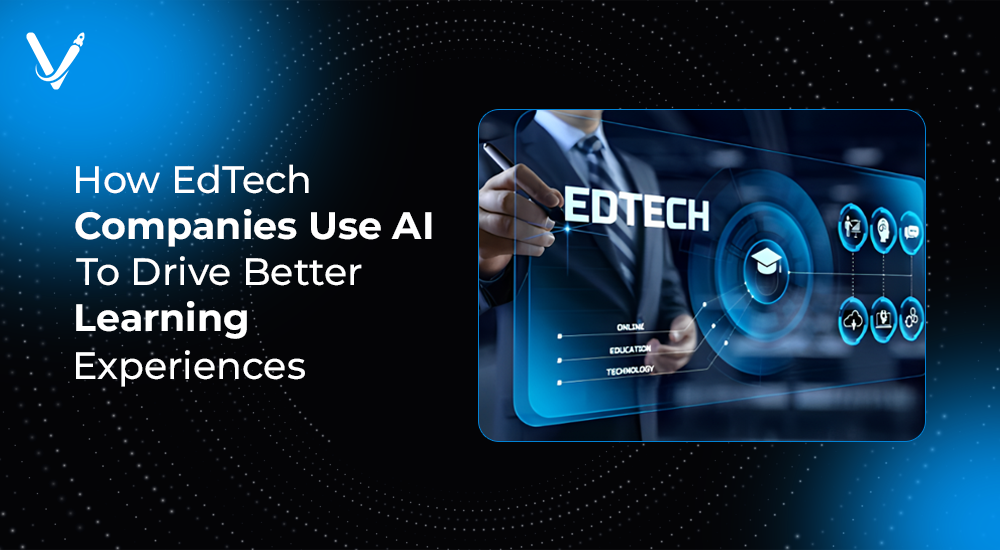How EdTech Companies Use AI to Drive Better Learning Experiences


- Apr 28, 2025



Education is no longer confined to the four walls of a classroom. Technology has cracked open new pathways to learn, grow, and succeed — and the biggest catalyst in this revolution is Generative AI in Education.
Across the globe, EdTech companies are redefining how students interact with knowledge. They’re building artificial intelligence applications in education that personalize learning, predict performance, automate content generation, and make education inclusive like never before.
But how exactly is AI shaping education as an industry? What are the real-world examples? How does it help both teachers and learners? Let’s dive deep into the new frontier of learning.
As we set the stage, it’s important to understand why the integration of AI in education isn't just a passing trend — it's a fundamental shift in how learning is designed, delivered, and experienced.
Today’s learners, from kindergarten to corporate professionals, expect more than just textbooks and lectures. They seek:
Traditional education models, with their standardized pace and curricula, struggle to meet these expectations.
AI offers the perfect solution: personalized, adaptive, scalable learning experiences that feel natural to digital natives.
The numbers don't lie:
The investment and innovation landscape signals one clear truth: EdTech powered by AI is the future.
EdTech companies are deploying AI across multiple touchpoints to create better experiences for learners, educators, and administrators alike. Let’s explore these in detail.
Personalization is no longer a luxury — it’s a necessity in modern education. Students learn differently, and AI helps address this diversity efficiently.
How AI Powers Personalization:
By analyzing a student’s:
AI systems can dynamically recommend resources, adjust course difficulty, and suggest study habits that optimize success.
Example:
Squirrel AI Learning uses sophisticated algorithms to create micro-personalized learning pathways for students, reportedly improving average student scores by 27%.
Benefits:
Action Tip: When building EdTech solutions, integrate an AI layer that continuously learns and adapts to individual student needs.
One-on-one tutoring has been proven to drastically improve learning outcomes — but it’s costly and logistically challenging at scale.
That’s where AI-powered Intelligent Tutoring Systems (ITS) shine.
What ITS Offer:
Example:
Carnegie Learning’s MATHia platform acts like a personal AI math tutor, providing immediate corrective feedback and hints without human intervention.
Why It’s Revolutionary:
Creating quality educational content is labor-intensive.
Generative AI in Education transforms this by enabling machines to generate and curate content in real time.
Capabilities of Generative AI:
Example:
Khan Academy recently launched Khanmigo, an AI-powered tutor and teaching assistant built on OpenAI’s GPT-4. It helps create personalized exercises and suggest improvements to student essays.
Impact:
Pro Tip: Partner with an experienced AI development company to build compliant, bias-free, and curriculum-aligned generative models.
Predicting student success used to be guesswork — today, it's data-driven and precise.
How AI Predicts Student Outcomes:
Example:
Georgia State University used predictive analytics to identify at-risk students early, offering timely interventions that raised their graduation rates by 30%.
Key Advantages:
Education isn't just about learning — it's also about managing complex systems behind the scenes.
AI eases administrative burdens significantly.
Tasks That AI Automates:
Example:
Unibuddy helps universities automate student communications during admissions, leading to a 15% faster conversion rate from inquiry to enrollment.
Outcome:
To better understand the scale and diversity of AI applications, let’s glance at real-world EdTech platforms making waves.
Platform | AI Application | Impact |
Duolingo | Personalized language learning journeys | 500M+ users globally |
Coursera | Skill-based course recommendations | 30% faster course completion |
Byju’s | Adaptive assessments and mentoring | 71M+ registered students |
Gradescope | AI-assisted exam grading | 10x faster feedback delivery |
These examples show how versatile and impactful AI solutions can be when applied thoughtfully.
AI is not just a backend tool — it has a direct, tangible impact on students' learning experiences.
In short, AI makes learning more accessible, engaging, and equitable.
It’s important to step back and see the broader, systemic benefits AI brings to the education ecosystem.
AI enables institutions to scale their offerings to thousands — or millions — of students while maintaining personalized support.
With AI, education becomes truly global. Students of all abilities, backgrounds, and geographies can participate equally.
Teachers and administrators spend less time on repetitive tasks and more on creative, strategic endeavors.
Data analytics reveal what works and what doesn’t, helping continuously optimize course offerings.
AI-powered simulations, interactive quizzes, and personalized feedback create a richer, more motivating learning experience.
While the promise is bright, adopting AI in education also presents its unique set of challenges.
Being aware of these issues — and preparing for them — is essential.
With student data being collected and analyzed, privacy becomes a primary concern.
Solution:
Implement GDPR-compliant practices, encrypt data flows, and transparently communicate data usage to all users.
AI systems can inadvertently perpetuate biases if trained on skewed data.
Solution:
Audit algorithms regularly. Diversify data sets. Include ethics reviews as part of your development pipeline.
Building and maintaining AI systems can strain resources.
Solution:
Start with modular AI components (e.g., a chatbot or recommendation engine) before expanding into full personalization engines.
Partner with a cost-efficient yet expert AI development company.
Educators and administrators may resist AI-driven systems due to fear of obsolescence.
Solution:
Offer extensive training, highlight how AI empowers rather than replaces teachers, and promote success stories internally.
The horizon looks exciting. Let’s peek into what's coming next.
AI will curate bite-sized learning experiences that align perfectly with a student's daily routines and attention spans.
Future systems will detect boredom, frustration, or confusion in students through facial expressions and tone, dynamically adapting lesson delivery.
AI systems will guide students in course selections based on predictive analytics tied to future job market trends.
Imagine learning about ancient Rome by "walking" through AI-simulated forums in VR, interacting with AI-driven avatars — this is the future of experiential education.
If you're building or scaling an EdTech platform, integrating AI doesn't have to be daunting.
The evolution of education as industry is unstoppable — and Generative AI in Education is leading the charge. Smart, personalized, inclusive education isn't just an ideal anymore; it’s a reality EdTech companies can deliver today with the right technology partners.
At Vasundhara Infotech, we are passionate about building the future of learning.
As a top-tier AI development company, we help you design and deploy artificial intelligence applications in education that are secure, scalable, innovative, and impactful.
Ready to revolutionize learning experiences with AI.
Contact us today and start your EdTech transformation journey!
Copyright © 2026 Vasundhara Infotech. All Rights Reserved.